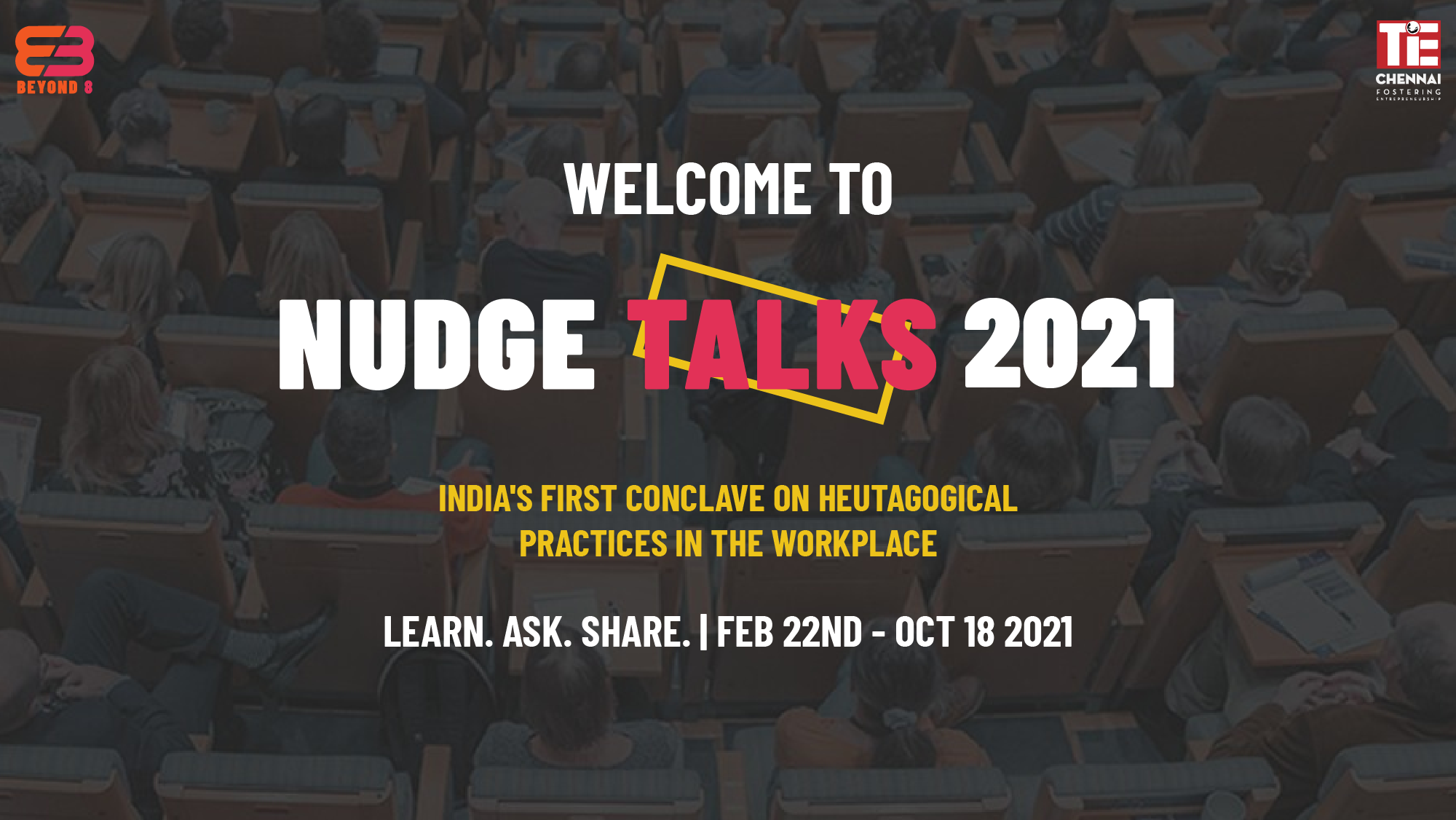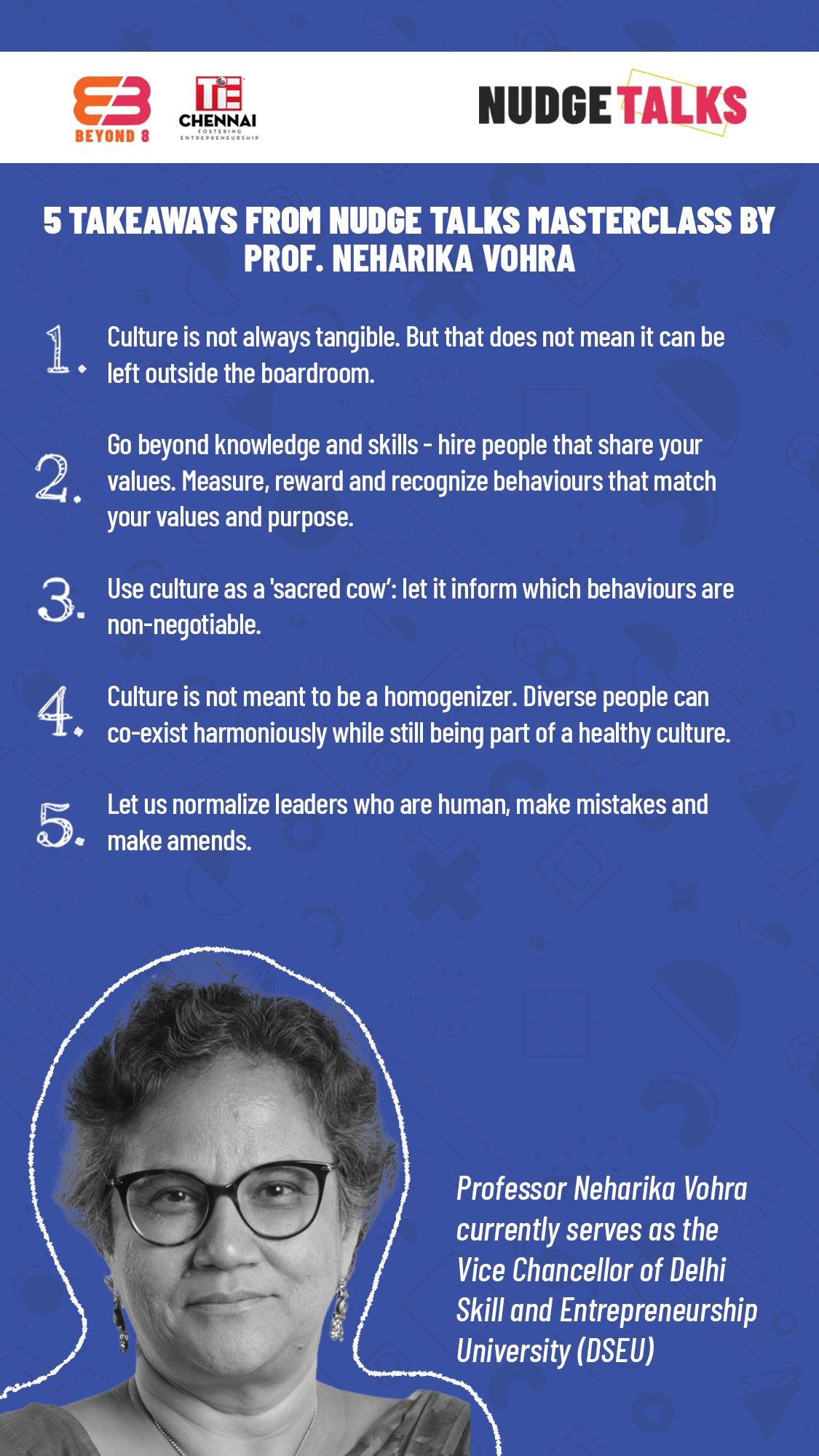5 fresh takes on organisational culture for entrepreneurs
28 February 2021 — Written by Reyan Mishra

Nudge Talks 2021, India’s first conclave on heutagogical practices at the workplace, opened to an overwhelming response from entrepreneurs and business owners alike last week. Designed for anyone who has the burning desire to bring their ideas and dreams to life, this series of talks will see an eclectic mix of thinkers, practitioners and experts come together on one platform.
The very first imperative that Nudge Talks addressed was that of organizational culture. Who better to address this theme than Professor Neharika Vohra who currently serves as the Vice Chancellor of Delhi Skill and Entrepreneurship University (DSEU)? Be it women empowerment, leadership or organizational behavior, Professor Neharika is greatly revered for her knowledge and experience in the industry and academia. In her masterclass, she led an insightful conversation that touched upon professional success, social harmony, and personal satisfaction. Below are the ones that stayed with us:
Culture is not always tangible, but that does not mean it can be left outside the boardroom
Ask any thriving organization and they will tell you that culture eats strategy for breakfast! Without the right culture in place, even the smartest strategy will crumble under its own weight. In what Professor Neharika refers to as ‘Culture Soup’ (as culture is a recipe that everyone can make, taste, change, and even serve), there needs to be a perfect balance between its myriad ingredients. Culture rarely makes us money, but it gets us results - positive or negative! While it is a concept that is not always tangible, it is certainly felt by our people. Therefore, we need to give organizational culture the weightage it deserves in our boardroom priorities.

Go beyond knowledge and skills - hire people that share your values. Measure, reward, and recognize behaviors that match your values and purpose
Our people are not just consumers of our organization’s culture - they are co-creators. This simply means, the people we hire will be the torchbearers of the value systems ingrained in our workplaces. So it is of paramount importance to look beyond skills and knowledge in the hiring process: we need to be looking for people who share our ethos and values, who are closest to the ‘perfect fit’.
A good leader’s work does not end with hiring the right people. It extends to measuring and rewarding behaviours that mirror your culture, be it mutual respect for all or responsibility with freedom.
Use culture as a ‘sacred cow: let it inform which behaviors are non-negotiable
Often, culture can be used to guide organizations towards understanding what is completely unacceptable to them. Professor Neharika refers to them as ‘sacred cows’. For instance, at IIM Ahmedabad, where she has taught for over two decades, the sacred cow is that students cannot reschedule their classes at any cost. Similarly, at the University of Cambridge, there is the rule which clearly states that there is nothing in the process that cannot be changed - so the sacred cow there is that being relevant to the present is more important than building a brand-confinement for Cambridge’s legacy. This is one of the main reasons why Cambridge has survived 800 years.
Closer to home, at Beyond 8 - our own sacred cow was that ‘filmy’ songs would not be played at school programs. However, in the vein of being learner-determined, we realized that we had to tweak our culture as we go along to suit the needs of our learners. It is what keeps us true and authentic to our values.
Let us normalize leaders who are human, make mistakes, and make amends:
An interesting question that arose during the masterclass was: how does one fix less-than-ideal-decisions one has made as a leader in the past? Will these faux pas taint the future culture of an organization? Professor Neharika believes that it will not, if a leader is quick to introspect and correct those decisions. With a little consideration and understanding of the nature of people’s emotions and values, they can make things right.
She believes that leaders are humans too, not superheroes, and that they too should be allowed to make mistakes and learn as they go along.
Culture is not meant to be a homogenizer - diverse people can co-exist harmoniously while still being part of a healthy culture
In the course of the conversation, another interesting thought emerged: how does culture pan out in organizations with mixed age groups? How does a leader cater to their starkly different interests and keep everyone happy? Professor Neharika believes that culture is not intended to be a homogenizer - everybody need not agree with everybody. A cultured section of society would not ideally mean all having similar kinds of views, faiths, and social and personal systems. People are not homogenized as they have natural differences and oftentimes experience-based.
From an organization’s perspective, diversity in age, faith and ideas is something that cannot be and should not be eliminated. Not only people with differences can co-exist, but they can also deliver optimal results whilst united.
Found these insights useful? Sign up for more masterclasses, workshops and fireside chats on Nudge Talks 2021. You can also follow Beyond 8 on Facebook and Instagram to stay updated on upcoming events.